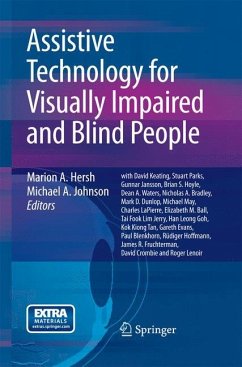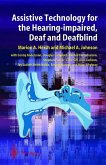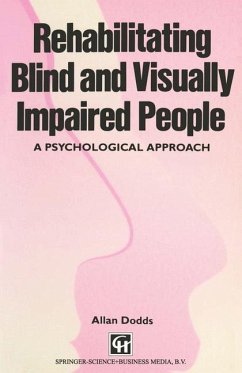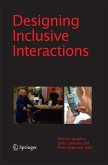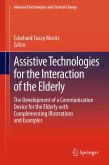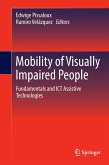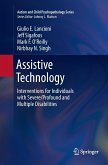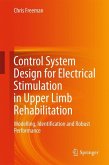Assistive Technology for Visually Impaired and Blind People
Herausgegeben:Hersh, Marion; Johnson, Michael A.
Assistive Technology for Visually Impaired and Blind People
Herausgegeben:Hersh, Marion; Johnson, Michael A.
- Broschiertes Buch
- Merkliste
- Auf die Merkliste
- Bewerten Bewerten
- Teilen
- Produkt teilen
- Produkterinnerung
- Produkterinnerung
Equal accessibility to public places and services is now required by law in many countries. It is often the use of specialised technology which can provide the vision-impaired with a fuller enjoyment of all the facilities of society. In this volume the engineering and design principles and techniques used in assistive technology for blind and vision-impaired people are explained.
Features: instruction in the physiology of the human visual system and methods of measuring visual ability; explanation of many devices designed for every-day living in terms of generic electrical engineering…mehr
Andere Kunden interessierten sich auch für
![Assistive Technology for the Hearing-impaired, Deaf and Deafblind Assistive Technology for the Hearing-impaired, Deaf and Deafblind]() Assistive Technology for the Hearing-impaired, Deaf and Deafblind70,99 €
Assistive Technology for the Hearing-impaired, Deaf and Deafblind70,99 €![Rehabilitating Blind and Visually Impaired People Rehabilitating Blind and Visually Impaired People]() Allan DoddsRehabilitating Blind and Visually Impaired People41,99 €
Allan DoddsRehabilitating Blind and Visually Impaired People41,99 €![Designing Inclusive Interactions Designing Inclusive Interactions]() Designing Inclusive Interactions154,99 €
Designing Inclusive Interactions154,99 €![Assistive Technologies for the Interaction of the Elderly Assistive Technologies for the Interaction of the Elderly]() Assistive Technologies for the Interaction of the Elderly77,99 €
Assistive Technologies for the Interaction of the Elderly77,99 €![Mobility of Visually Impaired People Mobility of Visually Impaired People]() Mobility of Visually Impaired People178,99 €
Mobility of Visually Impaired People178,99 €![Assistive Technology Assistive Technology]() Giulio E. LancioniAssistive Technology77,99 €
Giulio E. LancioniAssistive Technology77,99 €![Control System Design for Electrical Stimulation in Upper Limb Rehabilitation Control System Design for Electrical Stimulation in Upper Limb Rehabilitation]() Chris FreemanControl System Design for Electrical Stimulation in Upper Limb Rehabilitation77,99 €
Chris FreemanControl System Design for Electrical Stimulation in Upper Limb Rehabilitation77,99 €-
-
-
Equal accessibility to public places and services is now required by law in many countries. It is often the use of specialised technology which can provide the vision-impaired with a fuller enjoyment of all the facilities of society. In this volume the engineering and design principles and techniques used in assistive technology for blind and vision-impaired people are explained.
Features: instruction in the physiology of the human visual system and methods of measuring visual ability; explanation of many devices designed for every-day living in terms of generic electrical engineering principles; sections of practical projects and investigations which will give the reader ideas for student work and for self teaching; contributions by authors of international repute from divers fields which co-operate under the banner of assistive technology, among them: artificial vision systems; psychology, haptics, electrical engineering, design and visual physiology.
Features: instruction in the physiology of the human visual system and methods of measuring visual ability; explanation of many devices designed for every-day living in terms of generic electrical engineering principles; sections of practical projects and investigations which will give the reader ideas for student work and for self teaching; contributions by authors of international repute from divers fields which co-operate under the banner of assistive technology, among them: artificial vision systems; psychology, haptics, electrical engineering, design and visual physiology.
Produktdetails
- Produktdetails
- Verlag: Springer / Springer London / Springer, Berlin
- Artikelnr. des Verlages: 978-1-4471-5898-1
- 2008
- Seitenzahl: 756
- Erscheinungstermin: 19. September 2014
- Englisch
- Abmessung: 235mm x 155mm x 41mm
- Gewicht: 1139g
- ISBN-13: 9781447158981
- ISBN-10: 1447158989
- Artikelnr.: 41522732
- Herstellerkennzeichnung Die Herstellerinformationen sind derzeit nicht verfügbar.
- Verlag: Springer / Springer London / Springer, Berlin
- Artikelnr. des Verlages: 978-1-4471-5898-1
- 2008
- Seitenzahl: 756
- Erscheinungstermin: 19. September 2014
- Englisch
- Abmessung: 235mm x 155mm x 41mm
- Gewicht: 1139g
- ISBN-13: 9781447158981
- ISBN-10: 1447158989
- Artikelnr.: 41522732
- Herstellerkennzeichnung Die Herstellerinformationen sind derzeit nicht verfügbar.
Dr Hersh is currently a senior Lecturer in the Department of Electronics and Electrical Engineering, University of Glasgow. She was previously a lecturer in this Department. She has also held posts as a Post-doctoral Research Fellow at the Universities of Sussex and Strathclyde. She has now been researching in the area of assistive technology for about 12 years. Her current research interests fall into four main areas: ¿ Assistive technology, particularly for people with sensory impairments. ¿ Ethics and Social Responsibility Issues in Science and Engineering. ¿ Good design practice, including the principles of sustainable and universal design, end user involvement and human centred design approaches. ¿ The research process. She is continuing to run the successful CVHI conference series `Conference and Workshop on Assistive Technologies for People with Vision and Hearing Impairments¿, which she initiated with Prof Mike Johnson of the University of Strathclyde. Funding for the first three events was obtained from the EC High-Level Scientific Conferences Programme and the current funding for three further events, of which one has already taken place. Distinctive features of this conference series include the support given to young researchers and the conference ambience which encourages networking. Current research projects in the area of assistive technology include the development of a communication and interface device for deafblind people, distance learning for people with mobility impairments with colleagues from Germany, Hungary and Romania and travel support technology for blind people with colleagues from France. Having been a workaholic for most of her life, Dr Hersh has recently become aware of the importance of making leisure activities accessible. Research carried out for the book has confirmed the lack of technology to support the involvement of blind people in sport and other leisure activities. Research projects in this area include technological support for learning swimming and cycling in quiet areas for blind people. Dr Hersh recently published Mathematical Modelling for Sustainable Development with Springer Verlag (2006). It is organised into three parts, each of which considers the application of a particular type of mathematical or computing technique to problems in sustainable development. Particular features of the book include the large number of examples of the application of the techniques to problems in sustainable development, the detailed case studies, for instance of the application of systems theory to sustainable waste management and the introduction of fuzzy set techniques she developed. She has worked on applications of these techniques in collaboration with colleagues from Germany and Romania. Dr Hersh¿s awareness of the importance of interdisciplinarity for successful research in assistive technology has led her to an examination of the research process and publications on interdisciplinary work and research cultures with colleagues from Wales. Dr Hersh is a Member of the Institute of Mathematics and its Applications, the Institution of Engineering and Technology (UK) and the Institute of Electronic and Electrical Engineers (USA). Professor Johnson¿s academic career has concentrated on control engineering, theory and applications. He has significant industrial control applications and research experience. He is the author and co-author of books and technical papers on power generation, wastewater control, power transmission, and control benchmarking. He has had a number of student projects in the area of assistive technology and has successfully trained over 40 engineers to PhD level in last 20 years. He is joint Editor to Springer-Verlag-London monograph series Advances in Industrial Control and to the Springer-Verlag-London Advanced Textbooks in Control and Signal Processing series. He was an Associate Editor for Automatica in the years 1985-2002. His interest in Assistive Technology came through undergraduate teaching commitments which included student group study dissertations at 2nd Year level and assorted project supervision at Masters and undergraduate level. These were used to explore some EEE aspects of assistive devices for the hearing impaired. Subsequent collaboration with Dr. Hersh at the University of Glasgow led to a set of targeted activities in this area. These include a new course module, a new conference series and some research projects. Professor Johnson retired from academic life in 2002 and was made an Emeritus Professor of the University of Strathclyde in 2003. Emeritus Professor Johnson is a member of Deafblind, UK and the British Retinitis Pigmentosa Society.
Disability and Assistive Technology Systems.- Perception, the Eye and Assistive Technology Issues.- Sight Measurement.- Haptics as a Substitute for Vision.- Mobility: An Overview.- Mobility AT: The Batcane (UltraCane).- Navigation AT: Context-aware Computing.- Accessible Global Positioning System (GPS) and Related Orientation Technologies.- Electronic Travel Aids: An Assessment.- Accessible Environments.- Accessible Bus System: A Bluetooth Application.- Accessible Information: An Overview.- Screen Readers and Screen Magnifiers.- Speech, Text and Braille Conversion Technology.- Accessing Books and Documents.- Designing Accessible Music Software for Print Impaired People.- Assistive Technology for Daily Living.- Assistive Technology for Education, Employment and Recreation.
Disability and Assistive Technology Systems.- Perception, the Eye and Assistive Technology Issues.- Sight Measurement.- Haptics as a Substitute for Vision.- Mobility: An Overview.- Mobility AT: The Batcane (UltraCane).- Navigation AT: Context-aware Computing.- Accessible Global Positioning System (GPS) and Related Orientation Technologies.- Electronic Travel Aids: An Assessment.- Accessible Environments.- Accessible Bus System: A Bluetooth Application.- Accessible Information: An Overview.- Screen Readers and Screen Magnifiers.- Speech, Text and Braille Conversion Technology.- Accessing Books and Documents.- Designing Accessible Music Software for Print Impaired People.- Assistive Technology for Daily Living.- Assistive Technology for Education, Employment and Recreation.

